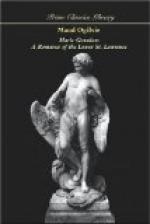“She is; and I must go back to England.”
“You have come, and now I advise you to wait till I return. And, let me tell you that cabling is very expensive just now. You will only waste your money for nothing, and besides will be snubbed for your pains by Lady McAllister.”
The speaker who gave this sage advice was a little old man, with a wizened face like parchment. His keen blue eyes had a shrewd twinkle in them, and altogether he gave one the impression that he could see further into a stone wall than most people. He was the confidential lawyer and intimate friend of Lady McAllister, of Dunmorton Castle in Fife, and had served the family for more than forty years.
His companion was a young Londoner, somewhat of the Cockney stamp, by name Thomas Brown, a youth chiefly celebrated for his immense estimation of his own capabilities.
The two men had arrived a week before by one of the mail steamers, and had, in accordance with Lady McAllister’s commands, visited nearly every churchyard in the district to discover the name of McAllister.
Hitherto this had been a thankless task. Now, dispirited and fatigued, they were leaning upon the rough wooden fence which divided the burying ground of Father Point church from the road. This church, dedicated to the Good St. Anne, had been built by the pious efforts of pilots on the ships plying the River St. Lawrence and the Gulf. It was intended to be a thankful recognition to their patron saint for their deliverance from the perils of the deep.
And the church had become a noted place for pilgrimages. Indeed, it was said that miraculous cures were effected by the agency of a sacred relic of St. Anne, and many a sufferer was brought here in the hope that, by performing his devotions at the shrine of St. Anne, he would be cured of his maladies.
There was something very pathetic about the lonely little churchyard of Father Point, with its borders of overgrown raspberry bushes straggling in untidy clusters round the graves. At one end of the ground were five graves, marked each by plain wooden crosses, painted a dull black, with the Christian names in white of those who slept beneath. These rough crosses marked the resting-places of the good nuns, who had spent their lives working in this part of the country. All that is left to serve as remembrance of their struggles, their trials, their brief glimpses of happiness, are these wooden crosses, from which the rain of a few autumn days effaced even the names of those who labored so long and faithfully.
This evening everything is very calm and still, and the peace of nature is only disturbed by the tinkling of the bells on the necks of the cattle as they are driven home by the French Canadian cow-herds. A silence seems to have settled over the whole face of nature. Presently, however, from the open windows of the church comes a song, faint at first, but swelling louder and stronger, on the evening breeze:




